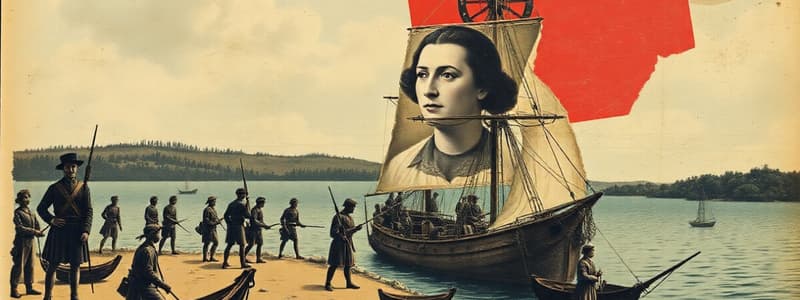Podcast
Questions and Answers
What was a significant factor in the Continental Army forcing the British to abandon Boston in 1776?
What was a significant factor in the Continental Army forcing the British to abandon Boston in 1776?
- The use of guerilla tactics
- Cannons taken from Fort Ticonderoga (correct)
- Allied support from the French
- Defeating the British navy
Thomas Paine's pamphlet 'Common Sense' advocated for loyalty to Great Britain.
Thomas Paine's pamphlet 'Common Sense' advocated for loyalty to Great Britain.
False (B)
Who led the Continental Army during the American Revolution?
Who led the Continental Army during the American Revolution?
George Washington
The British forces defeated the Continental Army at the Battle of __________ in 1776.
The British forces defeated the Continental Army at the Battle of __________ in 1776.
Match the following events with their corresponding descriptions:
Match the following events with their corresponding descriptions:
What did George Washington use to help his army escape capture at the Battle of Brooklyn?
What did George Washington use to help his army escape capture at the Battle of Brooklyn?
George Washington's leadership had no significant impact on the outcome of the American Revolution.
George Washington's leadership had no significant impact on the outcome of the American Revolution.
What significant event did Christopher Columbus mistakenly believe he had reached upon arriving in Central America in 1492?
What significant event did Christopher Columbus mistakenly believe he had reached upon arriving in Central America in 1492?
The Boston Tea Party occurred in 1770.
The Boston Tea Party occurred in 1770.
Which act required American colonists to pay taxes on printed materials?
Which act required American colonists to pay taxes on printed materials?
The __________ marked the beginning of the American Revolutionary War when British troops and colonists clashed in 1775.
The __________ marked the beginning of the American Revolutionary War when British troops and colonists clashed in 1775.
Match the following events to their descriptions:
Match the following events to their descriptions:
What was one major outcome of the French and Indian War for Britain?
What was one major outcome of the French and Indian War for Britain?
The Siege of Boston involved British troops being surrounded by Patriot militias.
The Siege of Boston involved British troops being surrounded by Patriot militias.
What was the primary reason for colonial protests against the Stamp Act?
What was the primary reason for colonial protests against the Stamp Act?
Study Notes
Christopher Columbus
- Christopher Columbus arrived in Central America in October 1492, believing he had reached India.
- Columbus's arrival marked the beginning of European exploration and colonization of the Americas.
- While Columbus did not discover America as the Vikings did in the 11th century, his voyage had a significant impact on the Americas.
The French and Indian War (Seven Years' War)
- The French and Indian War (1754-1763) emerged from tensions between France and Britain over control of North America.
- The war saw George Washington, then a lieutenant-colonel, lead British and Native American troops against French forces.
- Britain ultimately won the war, gaining territory in North America and significantly increasing its debt.
The American Revolution
- Following the French and Indian War, Britain imposed taxes on the American colonies to pay off its war debt.
- The Stamp Act, introduced in 1765, required colonists to pay taxes on printed materials like legal documents and playing cards.
- Colonists protested the Stamp Act, arguing for no taxation without representation, as they had no representatives in the British Parliament.
The Boston Massacre
- In 1770, a clash between British troops and colonists in Boston resulted in the death of five civilians.
- This event became known as the Boston Massacre and further inflamed tensions between the colonists and the British.
The Boston Tea Party
- In 1773, colonists disguised as Native Americans boarded British ships in Boston Harbor and dumped 10,000 pounds of tea into the water.
- This act of defiance, known as the Boston Tea Party, was a major turning point in the road to revolution.
The First Continental Congress
- In 1774, delegates from 12 colonies met in Philadelphia for the First Continental Congress.
- They discussed the growing tensions with Britain and issued demands for the repeal of taxes and the restoration of colonial rights.
The Beginning of War
- The British sent troops from Boston to Concord in 1775 to seize colonial arms and ammunition.
- In Lexington, the first shots of the American Revolutionary War were fired, marking the beginning of the fight for independence.
The Siege of Boston
- Following the battles at Lexington and Concord, Patriot militias surrounded Boston, effectively putting the city under siege.
- Benedict Arnold, a Patriot leader, captured Fort Ticonderoga and its valuable arsenal.
- The Continental Army, led by George Washington, successfully forced the British to abandon Boston in 1776 with the help of cannons taken from Fort Ticonderoga.
The Declaration of Independence
- In 1776, Thomas Paine's pamphlet "Common Sense" promoted the idea of American independence from Great Britain.
- The Continental Congress adopted the Declaration of Independence, formally declaring the United States of America as an independent nation.
The Battle of Brooklyn
- Following the Declaration of Independence, British forces under General William Howe arrived in New York and defeated the Continental Army at the Battle of Brooklyn in 1776.
- Washington's army narrowly escaped capture by using a thick fog as cover.
Washington's Leadership
- Despite early defeats, George Washington held together the Continental Army and inspired his troops.
- Washington's leadership proved critical in keeping the American Revolution alive.
Christopher Columbus's Arrival in the Americas
- Christopher Columbus arrived in the Americas in October 1492, believing he had reached India.
- His arrival marked the beginning of European exploration and colonization of the Americas.
- While Columbus did not discover America as the Vikings did in the 11th century, his voyage had a significant impact on the Americas.
### The French and Indian War (Seven Years' War)
- The French and Indian War (1754-1763) arose from tensions between France and Britain over control of North America.
- George Washington, then a lieutenant-colonel, led British and Native American troops against French forces.
- Britain won the war, acquiring territory in North America and significantly increasing its debt.
The American Revolution
- Following the French and Indian War, Britain levied taxes on the American colonies to settle its war debt.
- The Stamp Act, introduced in 1765, required colonists to pay taxes on printed materials such as legal documents and playing cards.
- Colonists protested the Stamp Act, arguing for "no taxation without representation" as they lacked representatives in the British Parliament.
The Boston Massacre
- In 1770, a confrontation between British troops and colonists in Boston resulted in the death of five civilians.
- This event, known as the Boston Massacre, further aggravated tensions between the colonists and the British.
The Boston Tea Party
- In 1773, colonists disguised as Native Americans boarded British ships in Boston Harbor and dumped 10,000 pounds of tea into the water.
- This act of defiance, known as the Boston Tea Party, was a crucial turning point towards revolution.
The First Continental Congress
- In 1774, delegates from 12 colonies assembled in Philadelphia for the First Continental Congress.
- They discussed the escalating tensions with Britain and issued demands for the repeal of taxes and the restoration of colonial rights.
The Beginning of the War
- In 1775, the British dispatched troops from Boston to Concord to seize colonial weapons and ammunition.
- The first shots of the American Revolutionary War were fired in Lexington, marking the start of the fight for independence.
The Siege of Boston
- After the battles at Lexington and Concord, Patriot militias encircled Boston, effectively placing the city under siege.
- Benedict Arnold, a Patriot leader, captured Fort Ticonderoga and its valuable arsenal.
- The Continental Army, led by George Washington, successfully forced the British to abandon Boston in 1776 with the aid of cannons taken from Fort Ticonderoga.
The Declaration of Independence
- In 1776, Thomas Paine's pamphlet "Common Sense" promoted the idea of American independence from Great Britain.
- The Continental Congress adopted the Declaration of Independence, officially declaring the United States of America as an independent nation.
The Battle of Brooklyn
- Following the Declaration of Independence, British forces under General William Howe arrived in New York and defeated the Continental Army at the Battle of Brooklyn in 1776.
- Washington's army narrowly escaped capture by utilizing a thick fog as cover.
Washington's Leadership
- Despite early defeats, George Washington held the Continental Army together and inspired his troops.
- Washington's leadership proved crucial in keeping the American Revolution alive.
Studying That Suits You
Use AI to generate personalized quizzes and flashcards to suit your learning preferences.
Description
Explore key events in American history, from Christopher Columbus's arrival in 1492 to the French and Indian War, and the American Revolution. Understand how these events shaped the early United States and led to significant changes in colonial life. Test your knowledge on the impact of these historical milestones.




